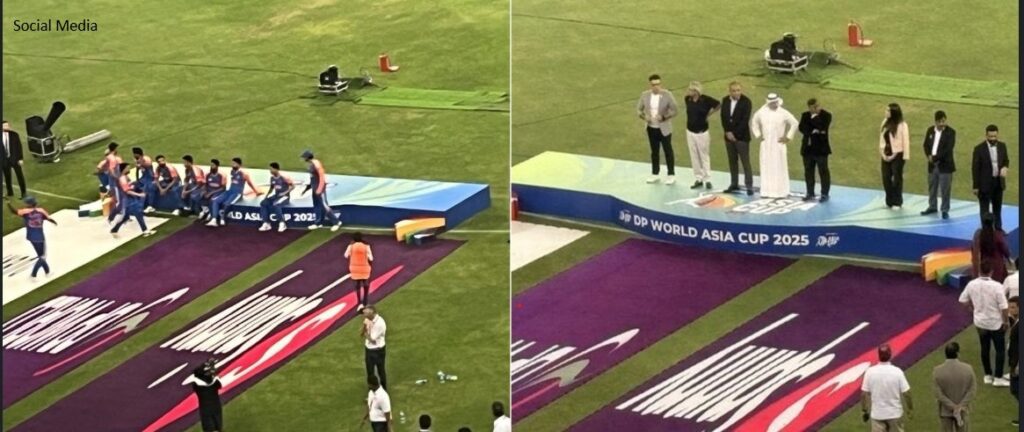Zahid Hashmi

Dubai: The Asia Cup closing ceremony turned chaotic on Sunday after the Indian cricket team refused to accept the winners’ trophy from Asian Cricket Council (ACC) president and Pakistan Cricket Board (PCB) chairman Mohsin Naqvi.
India had defeated Pakistan by five wickets in the final to secure a record-extending ninth Asia Cup title. But post-match proceedings were delayed as the players stood firm in their refusal, deepening the political undertones that had marked the tournament.
Ceremony in Disarray
While Pakistan captain Salman Ali Agha received the runners-up trophy, Indian players Tilak Varma, Kuldeep Yadav and Abhishek Sharma collected individual awards from other dignitaries. Naqvi, also Pakistan’s interior minister, remained on stage but was neither acknowledged by the Indian team nor seen applauding their achievements.
Commentator Simon Doull later announced that India would not be collecting the trophy. According to reports by the Press Trust of India, the trophy was eventually taken to the Indian dressing room.
Board of Control for Cricket in India (BCCI) official Devajit Saikia confirmed the decision, telling ANI news agency:
“We have decided not to take the Asia Cup trophy from the ACC chairman, who happens to be one of the main leaders of Pakistan.”
Political Backdrop
The decision comes against the backdrop of strained relations between the two nuclear-armed neighbours. Earlier this year, both sides engaged in military strikes following a deadly attack in Indian-administered Kashmir.
Throughout the Asia Cup, political gestures were evident — from refusal to shake hands to provocative celebrations. Indian captain Suryakumar Yadav dedicated an earlier victory to the Indian armed forces, while Pakistan’s Haris Rauf responded to crowd taunts with gestures referencing downed Indian jets.
Even Prime Minister Narendra Modi weighed in after the final, posting on X:
“Operation Sindoor on the game’s field. Outcome is the same — India wins!”
Naqvi responded sharply, accusing Modi of “dragging war into sport” and calling the remarks “a disgrace to the spirit of the game.”
Cricket Diplomacy in Decline
Cricket has long served as a tool of diplomacy between India and Pakistan, with leaders historically using the sport to ease tensions. From Zia-ul-Haq’s “cricket diplomacy” visit in 1987 to joint appearances by leaders in the 2000s, the game once bridged political divides.
Sunday’s episode, however, marks a new low. Analysts say India’s refusal to accept the trophy from Naqvi underscores a broader strategy of distancing itself from Pakistan across political, economic, and sporting fronts.
“The way the Asia Cup ended undermines any positive diplomatic outcomes that might have emerged from the tournament,” said Mathew John Moolakkattu, an Indian researcher on cricket diplomacy.
Despite India’s unbeaten run in the tournament, the final will be remembered less for runs and wickets — and more for the deepening rift between two cricketing giants.























